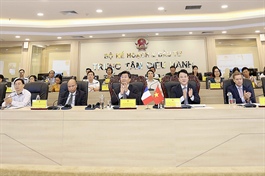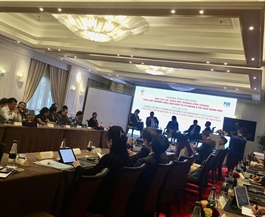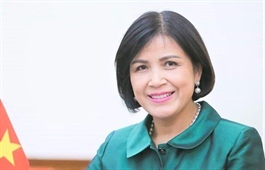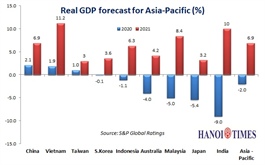Averting inflation due to excess cash in the system
Averting inflation due to excess cash in the system
As many companies cope with debts caused by the economic fallout due to the pandemic, they are unable to take loans for maintaining or expanding their business lines. In this scenario, in which banks see themselves confronted with excess capital, Dr. Vu Dinh Anh from the Ministry of Finance’s Price Market Research Institute warns about possible inflation if banks and state policies choose the wrong way.

Dr. Vu Dinh Anh from the Ministry of Finance’s Price Market Research Institute
|
The General Statistics Office (GSO) recorded for the first eight months of 2020 that 24,200 enterprises have ceased their operations and are pending dissolution procedures, with another 10,400 enterprises having already completed their dissolution. Additionally, the country had 30,600 companies not operating at their registered addresses, an increase of 39.3 per cent over the same period last year.
Generally, businesses only borrow money when they need it to invest in production or other business lines. However, as economic growth is currently low, many companies dissolve or go bankrupt since they do not have a viable direction to borrow funds for. If any company currently gains a loan from a bank, it is mostly for paying debts accumulated during the pandemic, and not to maintain or even expand their activities.
According to the GSO, this is the main reason for banks being unable to lend money and the generation of excess money in their vaults, which is not only reflected in the unprecedented low credit balance but also the current interbank market with scaled-down interest rates reaching almost zero per cent.
A couple of weeks ago, the overnight and 2-week interbank rates decreased by 0.02 and 0.19 per cent to 0.16 per cent per year and 0.3 per cent per year, respectively. Meanwhile, the 1-week interest rate increased slightly by 0.03 per cent to 0.26 per cent per year. Nevertheless, the prolonged excess liquidity of many banks may further push down the interbank rates closer to zero.
The main reason for this excess liquidity is this year’s imbalance of credit supply and demand as the latter declined rapidly due to the economic impacts of the pandemic. Another reason is the purchase of foreign currencies to increase the reserve thereof to $92 billion, which may even further increase to $100 billion.
Back in 2008, the total registered foreign direct investment reached more than $64 billion, nearly thrice the figure of 2007, which brought in a huge amount of foreign currency. As its impact was not neutralised, it became one of the main reasons for the high double-digit inflation. Excess money in the banking system is the inevitable consequence of the economy’s ability to absorb credit capital. If there is such excess money, banks will find a way to balance supply and demand. Should businesses remain unable to absorb the excess capital, banks will be more likely to relax their lending terms both for old and new loans.
As a result, future bad debt risk will increase. In addition, bank capital can flow into high-risk sectors, such as real estate and securities, thereby bypassing capital adequacy rules and lending restrictions for these areas.
Another way is to reduce the amount of capital raised through lowered deposit rates. Once these decrease, the difference between their interest rates and the lending interest rates will increase. However, at that point, the bank would again be exposed to risks from loosening credit conditions and pushing money into high-risk channels.
A third option is to reduce lending rates to stimulate credit absorption for those customers who still need loans. However, with this model, banks cannot lend money with high interest rates. Yet, as most customers are currently unable to maintain normal revenues, their need for credit loans is limited, which renders reduced interest rates practically useless.
Low economic growth, excess capital at banks, and increased foreign reserves are directly related to the national monetary policy. When banks have excess money, the general trend is that interest rates will fall.
Once the interest rate of the domestic currency falls, the currency itself will also depreciate. Meanwhile, using the domestic currency to buy a foreign one is essentially done to keep the local currency from appreciating due to the excess supply of foreign currencies.
However, buying foreign currency should go together with neutralising measures to prevent the possibility of capital inflows into a market in which banks already have excess funds. Otherwise, this scenario could lead to inflation during the upcoming year.
|
Credit growth in the first eight months of 2020 reached only 4 per cent Deposit rates decreased in August, while for the 6-month term the interest rate of state-owned banks decreased by 0.05 per cent. Interest rates of small joint-stock commercial banks with capital under VND5 trillion ($217 million) dropped the most with a decrease of 0.23 per cent, while those of larger joint-stock commercial banks increased by 0.18 per cent. For the 12-month term, deposit rates tended to decrease for JSC banks ranging from 0.09-0.27 per cent. In contrast, the deposit rates of state-owned banks increased by 0.2 per cent. Deposit rates continue to decline partly due to increased capital mobilisation. Source: Bao Viet Securities Report for August 31-September 4 |


























